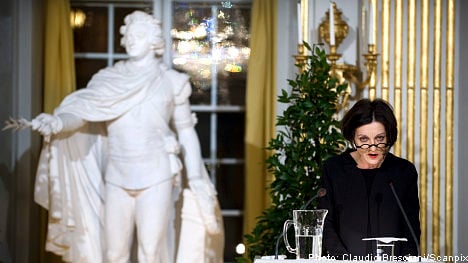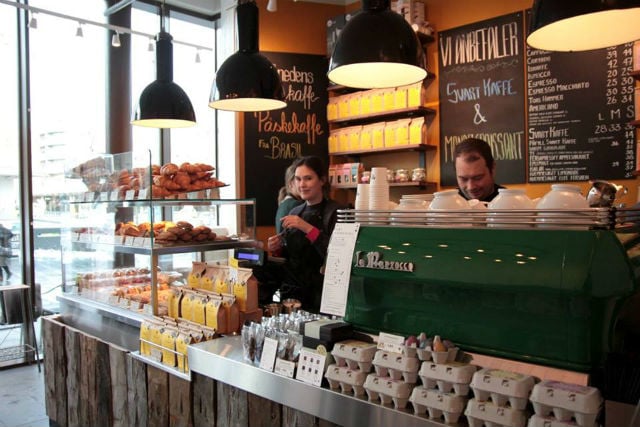Müller opened her speech with the question “Do you have a handkerchief?”, which her mother asked her every morning before she left the house. She would return to the house each day to fetch her handkerchief, a subtle and unspoken reminder of maternal love that remained with the young girl throughout the day.
“The question ‘Do you have a handkerchief?’ was an indirect display of affection. Anything more direct would have been embarrassing and not something the farmers practiced. Love disguised itself as a question,” she said.
Müller, who was born in a German-speaking enclave in Romania in 1953, then recounted her experience working in a factory as a translator, a job she was later fired from because she refused to work as an informant for the secret police.
Of the security official, she said: “With his briefcase under his arm he said quietly: ‘You’ll be sorry, we’ll drown you in the river.’ I said as if to myself: ‘If I sign that, I won’t be able to live with myself anymore, and I’ll have to do it on my own. So it’s better if you do it.’”
Returning to the symbolic handkerchief, Müller described its multi-layered meaning and its power of healing. “No other object in the house, including ourselves, was ever as important to us as the handkerchief. Its uses were universal: sniffles; nosebleeds; hurt hand, elbow or knee; crying, or biting into it to suppress the crying,” she said.
She then explained the symbolism of the handkerchief in the context of her experience under the dictatorship of Ceauşescu; the smallest objects and gestures of resistance represent the resilience of the human spirit in the face of adversity. “Is the question ‘Do you have a handkerchief?’ impossible to get rid of, even with a hammer and sickle, even with all the camps of Stalinist re-education?” Müller mused.
The literature laureate also reflected on her family’s struggle to reconcile the death of her uncle, who was a soldier in the German SS during WWII. It was the death of a Nazi, and the death of a son.
Müller then spoke of the power of the written word, and her own decision not to collaborate with the Communist authorities. “What can’t be said can be written, because writing is a silent act, a labour from the head to the hand,” she said.
“I talked a great deal during the dictatorship, mostly because I decided not to blow the trumpet. Usually my talking led to excruciating consequences. But the writing began in silence, there on the stairs, where I had to come to terms with more than could be said. What was happening could no longer be expressed in speech,” she continued.
Müller concluded her Nobel literature lecture by returning to the original question, pondering its true meaning:
“I wish I could utter a sentence for all those whom dictatorships deprive of dignity every day, up to and including the present—a sentence, perhaps, containing the word handkerchief. Or else the question: ‘Do you have a handkerchief?’ Can it be that the question about the handkerchief was never about the handkerchief at all, but rather about the acute solitude of a human being?”
Müller will receive the Nobel Prize in Literature on Thursday at the Stockholm Concert Hall.



 Please whitelist us to continue reading.
Please whitelist us to continue reading.
Member comments